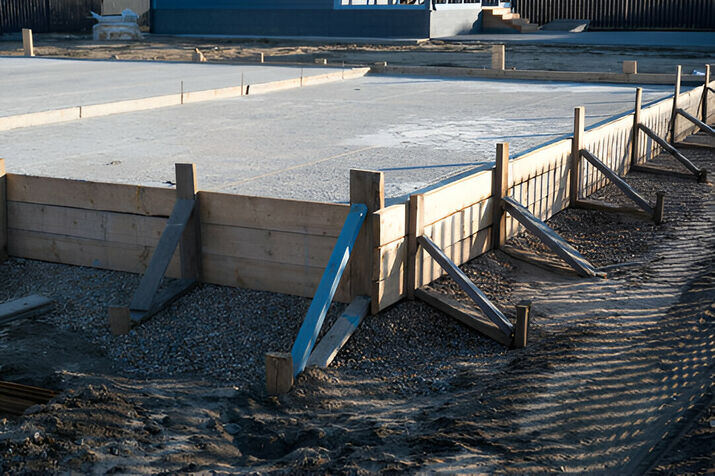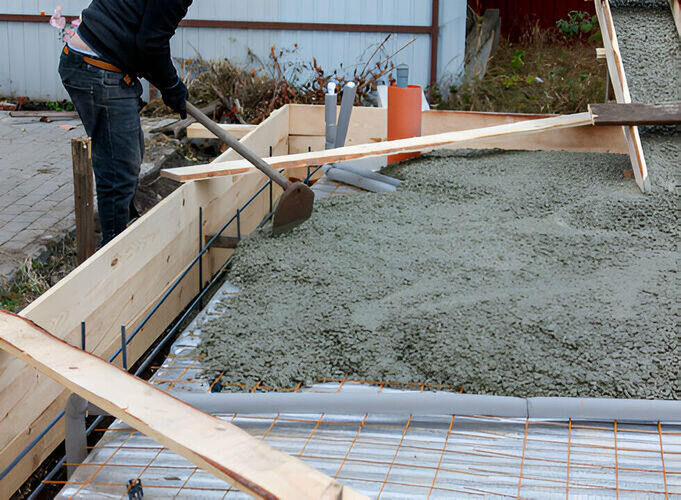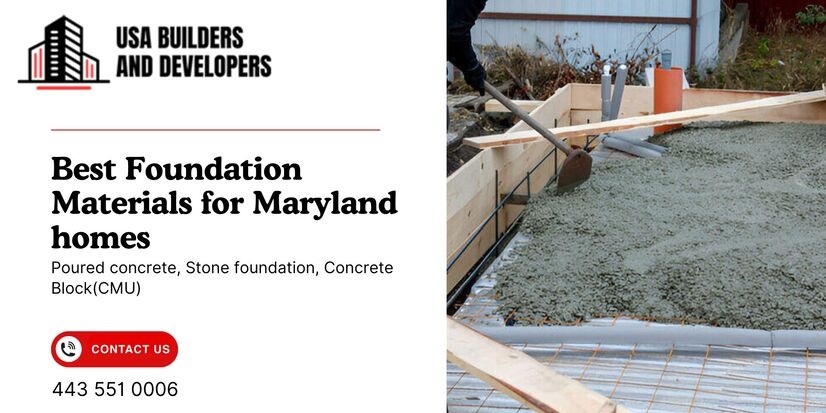Thinking about building a new home? One of the most important parts of your house is the foundation. It needs to be strong enough to handle heavy rains, changing seasons, and shifting soil. A solid base keeps your home safe, stable, and built to last.
In this guide, we’ll share the best foundation materials, how they perform, and what you can expect in terms of cost, care, and long-term durability.
At USA Builders and Developers, we provide trusted foundation services. Our team helps homeowners choose the right material and build a base that stands the test of time.
Why Foundation Materials Matter
Maryland has many areas with clay-heavy soil. That kind of soil holds water and shifts with the seasons. This movement can cause foundation problems if you don’t use the right material.
Common issues include:
- Cracks in walls or floors
- Water leaks in the basement
- Uneven flooring
- Long-term damage
Using the right foundation material helps avoid these problems and keeps your home safe for years.


Top Foundation Materials
Here are the top five foundation materials to consider. Each has pros, cons, and works best in different situations.
1. Poured Concrete
This is one of the most common choices today. It’s solid, smooth, and handles water and movement well. It works great for full basements or slabs.
- Strong and durable
- Good at blocking moisture
- Needs proper drainage
- Best for full basements
2. Concrete Block (CMU)
These blocks are stacked and sealed together. Many homes use them for crawl spaces or small buildings. They’re easy to install and budget-friendly.
- Quick to install
- Affordable
- Needs sealing to stop moisture
- Not as strong as poured concrete
3. Stone Foundation
Stone was used in older homes and still works today with some care. It gives a classic look but needs regular checks and sealing.
- Great for historic homes
- Long-lasting if maintained
- Needs waterproofing
- More expensive
4. Pressure-Treated Wood
This option is light and often used for cabins or sheds. It’s treated to resist bugs and rot, but not ideal for larger homes.
- Good for smaller structures
- Easy to work with
- Needs regular inspection
- Not suitable for wet areas
5. Insulated Concrete Forms (ICF)
This modern method combines foam insulation with concrete. It’s energy-efficient and strong but costs more up front.
- Excellent insulation
- Very durable
- High initial cost
- Great for new builds
Comparing Foundation Materials
Here’s a quick side-by-side look to help you compare your options:
| Material | Strength | Water Resistance | Cost | Best For |
|---|---|---|---|---|
| Poured Concrete | ★★★★★ | ★★★★☆ | Medium | Basements, full homes |
| Concrete Block (CMU) | ★★★★☆ | ★★★☆☆ | Low | Crawl spaces |
| Stone Foundation | ★★★★☆ | ★★☆☆☆ | High | Historic or rustic homes |
| Pressure-Treated Wood | ★★☆☆☆ | ★★☆☆☆ | Very Low | Small buildings, sheds |
| ICF | ★★★★★ | ★★★★★ | High | Energy-efficient homes |
What Impacts Your Foundation Choice?
Choosing the right foundation material depends on a few important things:
Soil Type
Clay soil is common in Maryland. It expands when wet and shrinks when dry. You need a flexible, reinforced material like poured concrete or ICF.
Water Levels
If you live near the bay or have a high water table, waterproofing matters. Go with ICF, poured concrete, or CMU with sealants.
Size of Your Home
Larger homes need stronger materials. Lighter options like wood won’t support much weight and may shift over time.
Budget
If you’re on a tight budget, concrete blocks or pressure-treated wood may be the best fit. For long-term savings, ICF pays off in energy bills.
Maintenance
Some materials like stone or wood need more care. If you want low maintenance, ICF or poured concrete is better.
Tips to Keep Your Foundation Strong
Here’s how to keep your foundation in top shape:
- Keep water away from the base with proper drainage
- Inspect yearly for cracks or signs of wear
- Seal gaps early before leaks cause damage
- Install a sump pump if needed in lower areas
- Use strong gutters to carry water far from the house
Frequently Asked Questions
Final Thoughts
Your foundation isn’t just what your home stands on – it’s what keeps your home safe, dry, and secure for years to come. The best foundation materials for Maryland homes depend on your soil, home size, water levels, and budget. From poured concrete to ICF, each option offers its own strengths.
Build smart. Stay strong. Choose the right foundation.
Have Questions? Call Us Now!
We’re here to help—quick answers, friendly service, anytime you need!

